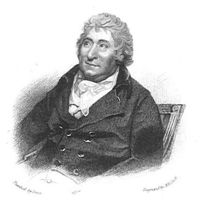Annotation:Warwickshire Lads
Back to Warwickshire Lads
WARWICKSHIRE LADS'. English, Air (6/8 time). G Major. Standard tuning (fiddle). ABB. A British song air and march from the Revolutionary War period. The song, by English stage composer Charles Dibdin (1745-1814), appeared in David Garrick's play The Jubilee (). It was published in London by John Johnson and Longman, Lukey and Broderip in Overture, Songs, Airs, and Chorusses, In the Jubilee or Shakespear's Garland (1770). The lyric begins:
Ye Warwickshire lads, and ye lasses,
See what at our Jubilee passes,
Come revel away, rejoice and be glad,
For the lad of all lads, was a Warwickshire lad,
Warwickshire lad,
All be glad,
For the lad of all lads, was a Warwickshire lad.
Be proud of the charms of your county,
Where Nature has lavish'd her bounty,
Where much she has giv'n, and some to be spar'd,
For the bard of all bards, was a Warwickshire bard,
Warwickshire bard,
Never pair'd,
For the bard of all bards, was a Warwickshire bard.
The air also was entered into the period music manuscript collections of John Fife (1780, perhaps from Perthshire) and John Molyneaux (1788, from Sherbourne, Nova Scotia).

Despite the English title, Elias Howe catagorizes it with his ‘Scotch Airs’.
Jubilee or Shakespear's Garlan
Source for notated version:
Printed sources: Howe (1000 Jigs and Reels), c. 1867; p. 143.
Recorded sources:
See also listing at:
Hear the song on youtube.com [1]
